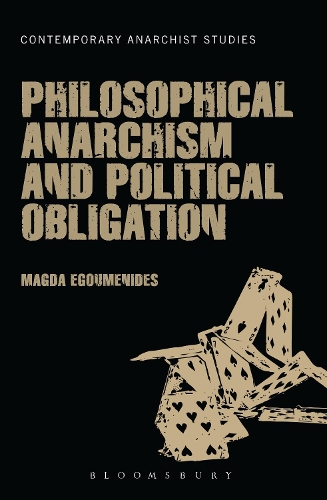
Philosophical Anarchism and Political Obligation
(Paperback)
Available Formats
Publishing Details
Philosophical Anarchism and Political Obligation
By (Author) Dr. Magda Egoumenides
Bloomsbury Publishing PLC
Bloomsbury Academic USA
23rd October 2014
United States
Classifications
Tertiary Education
Non Fiction
335.83
Physical Properties
Paperback
296
Width 150mm, Height 228mm, Spine 18mm
420g
Description
Political obligation refers to the moral obligation of citizens to obey the law of their state and to the existence, nature, and justification of a special relationship between a government and its constituents. This volume in the Contemporary Anarchist Studies series challenges this relationship, seeking to define and defend the position of critical philosophical anarchism against alternative approaches to the issue of justification of political institutions. The book sets out to demonstrate the value of taking an anarchist approach to the problem of political authority, looking at theories of natural duty, state justification, natural duty of justice, fairness, political institutions, and more. It argues that the anarchist perspective is in fact indispensable to theorists of political obligation and can improve our views of political authority and social relations. This accessible book builds on the works of philosophical anarchists such as John Simmons and Leslie Green, and discusses key theorists, including Rousseau, Rawls, and Horton. This key resource will make an important contribution to anarchist political theory and to anarchist studies more generally.
Reviews
In this thoughtful and passionately argued book Magda Egoumenides advances a distinctive approach to the problem of justifying political institutions that she calls critical philosophical anarchism. After critically assessing a variety of justifications of state authority, Egoumenides distinguishes her own view from other forms of philosophical anarchism by locating it firmly within a more comprehensive anarchist theory. The result is a book that raises serious questions about the existing literature on political obligation, while also offering a controversial and challenging alternative; and in the process Egoumenides does much to revive the vitality of anarchist thinking. * John Horton, Emeritus Professor of Political Philosophy at Keele University, UK *
Magda Egoumenides has done us the great service of keeping critical philosophical anarchism on the agenda of political philosophy. While not quite arguing for a anarchist position herself, Egoumenides demonstrates the importance of taking both the critical perspective and the positive insights of anarchism seriously. She reminds us that the existence of the state and the scope of its activities always face substantial moral challenge, and the battle for state legitimacy has to be fought and won on very difficult terrain. And she convincingly shows that anarchist theorists can also face challenges in living up to their own standards. This is a fresh and incisive contribution to the debate. * Jonathan Wolff, Professor of Philosophy, University College London, UK *
Philosophical Anarchism and Political Obligation speaks very cautiously and constructively to three constituencies: political philosophers who are troubled by the fundamental problem of political obligation; philosophical anarchists who are troubled by the grounds for and implications of their position; and political anarchists who are troubled by the fact that most people do not share their revolutionary point of view. As a member of all three constituencies, I find the book especially valuable. * Paul McLaughlin, Senior Lecturer, University of Tartu, Estonia *
Magda Egoumenides Philosophical Anarchism and Political Obligation is a rigorous and knowledgeable account of the analytic philosophical reading of anarchism. Egoumenides perceptively extends the scope of philosophical anarchisms critique of political obligation to contemporary anarchist and liberal theorists and arguments. It is a highly relevant text for all those engaged in this tradition. * Benjamin Franks, Lecturer, University of Glasgow, Scotland *
Author Bio
Magda Egoumenides is Visiting Lecturer at the University of Cyprus. She has published articles in the Review Journal of Political Philosophy, Isopolitia, and the book Critical Philosophical Anarchism.
